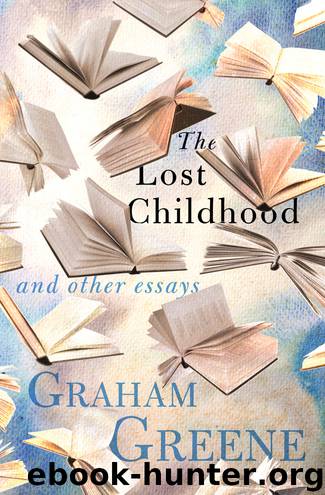The Lost Childhood by Graham Greene

Author:Graham Greene
Language: eng
Format: epub
Publisher: Open Road Media
Published: 2018-03-16T16:00:00+00:00
They make an amusing comparison, these germs of stories, anecdotes remarkable as a rule for their anarchy (an appalling negro in Haiti) or their ambiguity (as when Lord Jim passed across Conrad’s vision—‘One sunny morning in the commonplace surroundings of an eastern roadstead, I saw his form pass by—appealing—significant—under a cloud—perfectly silent’)—they make an amusing comparison with those neat little dinner-table stories which set James off constructing his more intricate and deeper fictions, holding up his hand in deprecation to prevent the whole story coming out (‘clumsy Life again at her stupid work’), just as the settings are socially widely dissimilar; Conrad on a small and dirty schooner in the Gulf of Mexico listening to the ferocious Ricardo’s low communings ‘with his familiar devil’, while the old Spanish gentleman to whom he served as confidant and retainer lay dying ‘in the dark and unspeakable cudd’; and James on Christmas Eve, before the table ‘that glowed safe and fair through the brown London night’, listening to the anecdote of his ‘amiable friend’. It was a strange fate which brought these two to settle within a few miles of each other and produce from material gained at such odd extremes of life two of the great English novels of the last fifty years: The Spoils of Poynton and Victory.
The thought would have pleased Conrad. It would have satisfied what was left of his religious sense, and that was little more than a distant memory of the Sanctus bell and the incense. James spent his life working towards and round the Catholic Church, fascinated and repelled and absorbent; Conrad was born a Catholic and ended—formally—in consecrated ground, but all he retained of Catholicism was the ironic sense of an omniscience and of the final unimportance of human life under the watching eyes. Edward Garnett brings up again the old legend of Slavic influence which Conrad expressly denied. The Polish people are not Slavs and Conrad’s similarity is to the French, once a Catholic nation: to the author for example of La Condition Humaine: the rhetoric of an abandoned faith. ‘The mental degradation to which a man’s intelligence is exposed on its way through life’: ‘the passions of men shortsighted in good and evil’: in scattered phrases you get the memories of a creed working like poetry through the agnostic prose.
Download
This site does not store any files on its server. We only index and link to content provided by other sites. Please contact the content providers to delete copyright contents if any and email us, we'll remove relevant links or contents immediately.
| Diaries & Journals | Essays |
| Letters | Speeches |
The Rules Do Not Apply by Ariel Levy(4969)
Bluets by Maggie Nelson(4556)
Too Much and Not the Mood by Durga Chew-Bose(4348)
Pre-Suasion: A Revolutionary Way to Influence and Persuade by Robert Cialdini(4232)
The Motorcycle Diaries by Ernesto Che Guevara(4098)
Walking by Henry David Thoreau(3962)
Schaum's Quick Guide to Writing Great Short Stories by Margaret Lucke(3380)
The Daily Stoic by Holiday Ryan & Hanselman Stephen(3317)
What If This Were Enough? by Heather Havrilesky(3311)
The Day I Stopped Drinking Milk by Sudha Murty(3197)
The Social Psychology of Inequality by Unknown(3029)
Why I Write by George Orwell(2952)
Letters From a Stoic by Seneca(2798)
A Short History of Nearly Everything by Bryson Bill(2698)
A Burst of Light by Audre Lorde(2607)
Insomniac City by Bill Hayes(2556)
Feel Free by Zadie Smith(2479)
Upstream by Mary Oliver(2389)
Miami by Joan Didion(2367)
